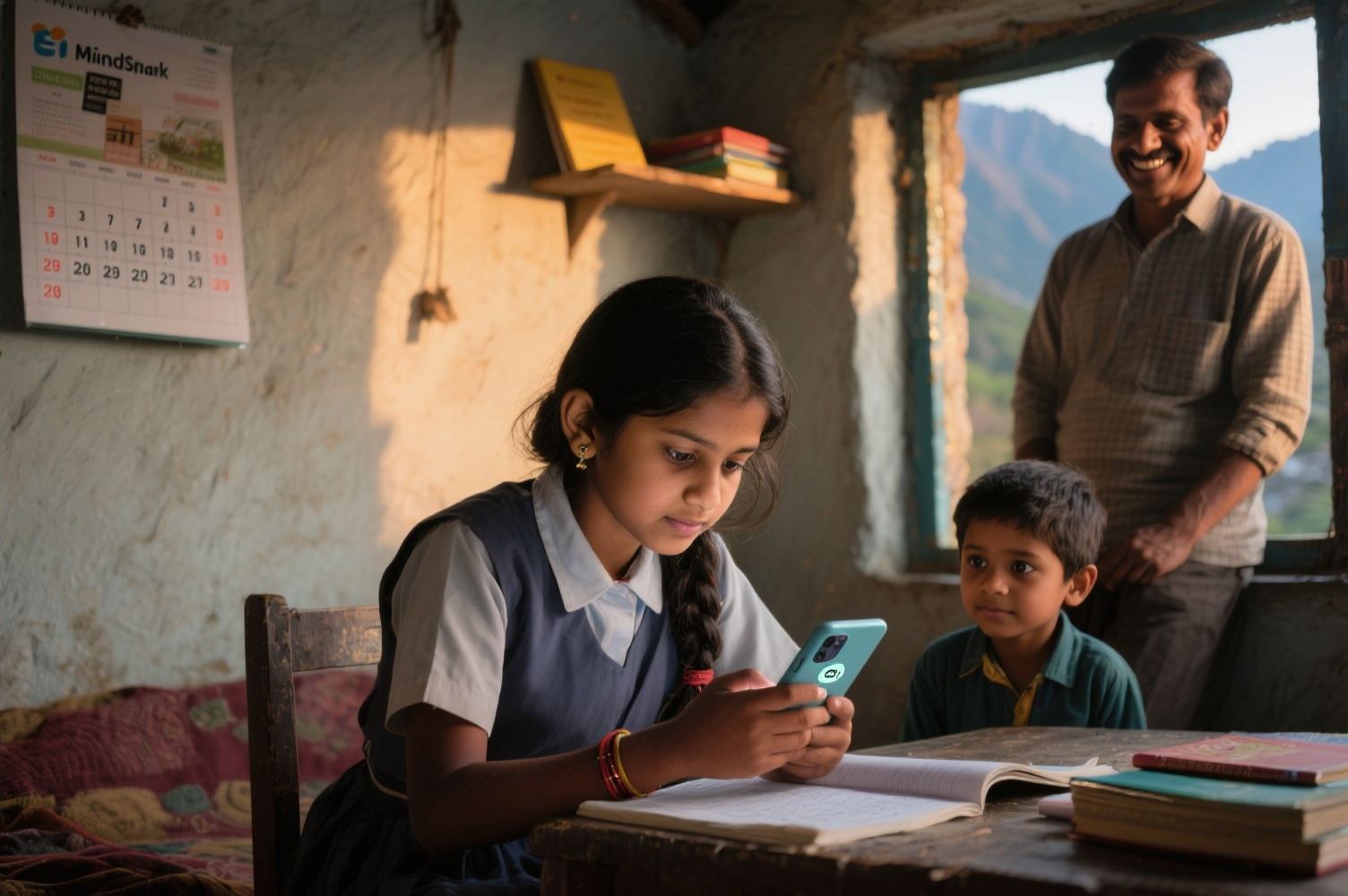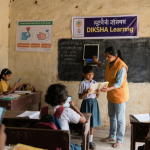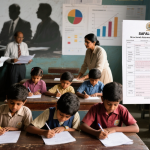- December 8, 2023
- by Educational Initiatives
- Blog
- 0 Comments
Muskan is a reserved child, at least in conversations. Her responses to questions tend to be a simple “yes, sir” or “no, sir”, punctuated by the occasional nervous giggle. “Uss ki umar ki koi nahi hain paas mein, kyun ki humaara ghar thhoda door hain baakiyon se,” her father, Jagatram, informs me (“there’s no one of her own age that lives nearby since our house is a little far away from others”). The remoteness of their house only compounds the remoteness of their village, which is about an hour away from the nearest town. And so Muskan spends her days in the company of her parents and brother, with few outlets for socialisation.
 She comes alive, though, when in pursuit of knowledge. According to her father, “voh apna saara time apne school ki kitaabon ke saath bitati thhi” (she’s always spent most of her time busy with her schoolbooks). Growing up, she’s made learning her refuge, and the pursuit of excellence her goal.
She comes alive, though, when in pursuit of knowledge. According to her father, “voh apna saara time apne school ki kitaabon ke saath bitati thhi” (she’s always spent most of her time busy with her schoolbooks). Growing up, she’s made learning her refuge, and the pursuit of excellence her goal.
When lockdowns were imposed due to COVID-19 last year then, it kept her away from school, and took away a great joy. Her school tried to teach remotely through videos and assignments sent via WhatsApp, but, according to Muskan, “vaise padhne mein mazza nahi aata thha” (it wasn’t fun to study this way). She didn’t have books to read, or friends for company. Though officially going through class 7 at the time, there was little she was learning. To make matters worse, her father found work as a labourer hard to come by during the lockdown.
In November, things changed for the better for Muskan. One of her teachers told her about a new programme the school was involved in, which would allow her to learn better at home. Her school had been brought under the ambit of Procter and Gamble’s Shiksha programme. With this, Muskan and other students from her school would have access to an application called ‘Mindspark’, a personal adaptive learning software developed by Educational Initiatives.
P&G Shiksha has been working with Educational Initiatives in Himachal Pradesh since 2018. Originally, it operated in 44 schools in the state and set up labs where about 3000 students engaged with Mindspark on a regular basis. On Mindspark, these students would study Maths, Hindi and English, aiming to bridge the gap between their actual learning level and the level expected by the curriculum for their class. These personalized lessons would give students much-needed individual attention and student usage data helps teachers better gauge the learning issues students faced.
The lockdown brought in-school engagement to a halt, but instead of slowing down, P&G Shiksha only dreamed bigger. If children couldn’t come to the Mindspark Lab, Mindspark would be taken to them. They worked with EI to make content accessible remotely through mobile phones, so that students could learn from the safety of home. They also aimed to increase the number of students they reached, expanding their coverage to almost 50,000 students in Himachal Pradesh.
Months of planning and negotiation by EI’s field teams with governments, district officials and schools, and this too in pandemic-riddled circumstances, bore fruit in November. Thousands of students like Muskan gained access to Mindspark, and have been using it since.
Muskan was thrilled by Mindspark. For a child yearning for knowledge, here was a system that brought it to her, and tailored it to her needs. “Shuru mein mushkil thha. Application samajh nahi aa raha thha, aur kafi questions galat ho rahe thhe. Thhode dinon mein samajh aane lag gaya, aur ab main bina kissi help ke sar sakti hoon” (It wasn’t easy in the beginning. I didn’t understand the application and used to get many questions wrong. In a few days, though, I was able to understand it, and can use it without any help).
After these initial growing pains, Muskan has not looked back.
There was mutual learning underway here. Over time, she better understood the application and the lessons taught. Similarly, the software better understood her, designed lessons suitable for her level, and used repetition to reinforce her learnings. Her Mindspark usage data testifies to this. As the image shows, she got multiple mathematical word problems involving more than one operation incorrect. Repetition and feedback with answer explanations, however, helped her understand the concept. Similarly, in English (as a second language), she made repeated mistakes identifying the correct form of verbs to be inserted in fill-in-the-blank exercises. Again, Mindspark’s emphasis on repetition made her practice similar questions till she got several correct in a row, to ensure that she had understood the concept.

Above and below: Muskan got mathematical problems involving more than one operation wrong; Mindspark repeated questions of a similar nature to help her understand the concept and get it right. Note that Mindspark gave correct answer explanation to help learn from.

She claimed a monopoly over her father’s phone most evenings and refused to sleep until she completed at least a few exercises. This, over and above class work assigned by her teachers. Even when schools re-opened briefly, she continued to work with Mindspark, completing levels upon levels in her pursuit of excellence.
“Usko matlab nahi ki kitna der ho jaaye, par Mindspark kiye bina voh soyegi nahi. Raat-din ka farak hai iss mein aur uske school ke kaam mein, toh main bahut khush hoon ki voh Mindspark kar rahi hai,” her father told me. (She doesn’t care how late it gets, but she won’t sleep without using Mindspark. There’s a difference of day and night between this [Mindspark] and her lessons from school, so I’m happy she’s using Mindspark.)
Her enthusiasm reflects clearly in her results. Since November, Muskan has used Mindspark for a total of 218 hours, averaging 8 hours a week; the highest of anyone in her class. During this time, she’s answered a total of 30,000 questions, and has got over 90% correct in Hindi and English, and over 65% correct in Maths. This dedication made her the best-performing amongst 2650 students in the Kullu district in December. For this, she was awarded a tablet computer to further help her learn.
Muskan’s love for knowledge runs deep, and she hopes to share this with others. “Mujhe teacher banna hai bade hokey. Voh mere Himachal ke gaon me ho yah bade shehar mein, par teacher banna hai!” she told me with great gusto (I want to become a teacher when I grow up. It doesn’t matter if it’s in my village in Himachal or a big city, but I want to become a teacher!”). She has already got a start on this ambition, helping her younger brother with his lessons wherever possible.
Her father gladly accepts her desire. “Mujhe bahut khushi hai ko voh teacher banna chahti hai. Vaise bhi, ek baar uska mann kissi cheez pe lag jaaye, toh kuch nahi kar sakte badalne ke liye,” he said with a laugh (I’m very happy for her to become a teacher. Either way, once she’s decided what she wants to do, we can’t really change her mind).
For millions of children, the last year has been challenging, to say the least. Kept away from school, they may have suffered setbacks to their learning that will be long-lasting. A study by the Azim Premji Foundation estimated that students in 92% and 82% of students India had lost at least one specific ability in math and language, respectively.
What’s worse, the coming year does not offer great clarity. If and when schools open, returning will be difficult. These students will be in higher classes and taught a tougher curriculum they may not be ready for. Here, tools like Mindspark offer hope. By helping children learn at a level appropriate for them, it can help mitigate and remediate learning losses in a targeted manner. It can also help teachers identity areas where students need help. Hopefully then, for Muskan and thousands of other Mindspark users like her, the impact of the pandemic on their learning remains minimal, and they can continue from where they left off.



